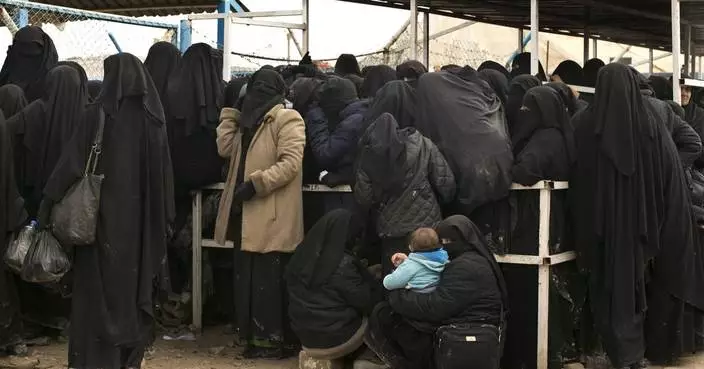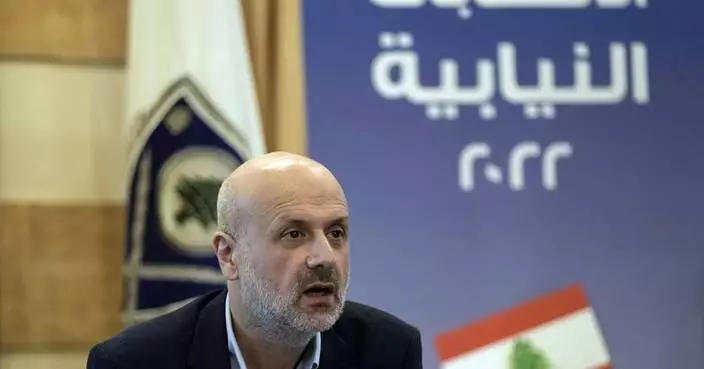With President Bashar Assad seemingly poised to survive the Syrian civil war, Israeli leaders are growing nervous about the intentions of his Iranian patrons and their emerging corridor of influence across the region.
Prime Minister Benjamin Netanyahu is agitating against Iran in global forums like this week's U.N. General Assembly. The Israeli military is holding war games targeting the Iran-backed Lebanese Hezbollah, and generals are issuing tough threats in hopes of avoiding what could be another ruinous Israeli entanglement in Lebanon, this time with Iranian advisers and troops on Israel's doorstep.
Israel has long identified Iran as its biggest threat, citing its suspect nuclear program, development of long-range missiles and hostile rhetoric. But gains by Syrian troops and their Iranian-backed allies have given those concerns new urgency.
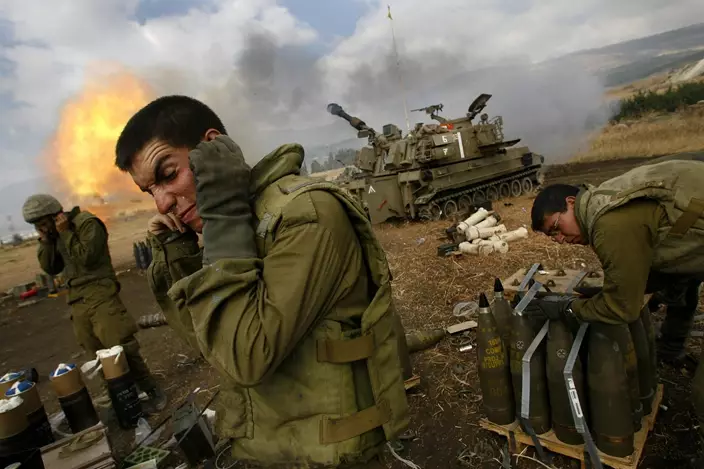
FILE - In this July 21, 2006 file photo, Israeli soldiers cover their ears as an artillery unit fires shells towards southern Lebanon from a position near Kiryat Shmona in northern Israel, near the border with Lebanon. (AP Photo/David Guttenfelder, File)
Israel fears the establishment of a Shiite "corridor," with land links from Iran to Lebanon, allowing the movement of fighters and weapons across the region. At the heart of those fears is Hezbollah, the Lebanese militia that battled Israel to a stalemate in a monthlong war in 2006. The group has greatly beefed up its arsenal of rockets and missiles since then, and after years of fighting in Syria, is more battle-tested than ever.
In his U.N. address Tuesday, Netanyahu warned that Iran was spreading a "curtain of tyranny and terror" across the region, and said Israel would defend itself.
"We will act to prevent Iran from establishing permanent military bases in Syria for its air, sea and ground forces. We will act to prevent Iran from producing deadly weapons in Syria or in Lebanon for use against us. And we will act to prevent Iran from opening new terror fronts against Israel along our northern border," he said.
Israel last week wrapped up its largest military exercise in two decades — mobilizing some 30,000 troops to train for the next war against Hezbollah.
In an exclusive interview with The Associated Press, the commander of the exercise, Maj. Gen. Tamir Hayman, said that despite Hezbollah's gains, the balance of power has greatly shifted in favor of Israel since 2006.
"If Hezbollah's capabilities have grown linearly, ours have grown exponentially, in intelligence, in targets and in the ability to attack," he said. If fighting resumes, "the damage to Hezbollah will be severe, mortal and comprehensive."
He said he was pleased with the performance of his troops, and said the two-week drill should send a powerful message of deterrence.
"We have no intentions at this time to go out and defeat Hezbollah. Our goal is to maintain the quiet and stability in the north," said Hayman, the commander of the army's Northern Corps.
Israeli forces on Tuesday shot down what Israel said was a Hezbollah surveillance drone that veered too close to the Syrian border with Israel. The military said the unmanned aircraft was Iranian-made and launched from a Damascus airport before it was shot down near the Israeli-controlled side of the Golan Heights.
After six years of fighting that claimed at least 400,000 lives, Assad's forces appear to have finally gained the upper hand as they recapture territory from the Islamic State group and opposition fighters.
Russia, which is waging an air campaign on behalf of Assad, and Iran and Hezbollah, which have fighters on the ground, have provided crucial support and are expected to play a major role in postwar Syria.
"The vector is quite clear right now, with the Syrian army, Hezbollah and the Shiite militias gradually regaining control of large swaths of the country," said Chagai Tzuriel, the director general of the Israeli Intelligence Ministry.
Israel has said any permanent presence of Iranian or Hezbollah troops along the Syrian border with Israel would be crossing a "red line," hinting that it would be willing to take military action if needed. Tzuriel warned of a "regional conflagration."
He said Russia could end up playing a positive role, because it wants to stabilize Syria. He said the Russians realize that Iran could create friction not only with Israel, but also with the Sunni majority in the region.
"I think there is a good chance that it will limit and restrain Iran, Hezbollah and the Shiite militias," he said.
But that is far from clear. Netanyahu last month flew to Russia to discuss Syria with President Vladimir Putin, but apparently returned home emptyhanded. Israeli media last week said Russia had rejected an Israeli request to keep the Shiite forces at least 60 kilometers (40 miles) from the border. Neither side has commented on the reports.
Intelligence Minister Yisrael Katz recently claimed at a security conference that Iran and Syria are working on an agreement that could bring an Iranian naval base, airport or army bases to Israel's doorstep, a major boost for Hezbollah.
"The Iranians may bring different kinds of missiles to Syria, and a large and well-equipped force of Shiite militias may settle there, including tens of thousands of Afghans, Pakistanis, Iraqis and Syrians whose goal is to threaten and battle Israel," Katz said. "Hezbollah will train and command the Shiite militias."
Israel has attempted to stay on the sidelines throughout the Syrian war. But it has admitted to carrying out dozens of airstrikes on what are believed to be shipments of "game changing" weapons, such as guided missiles or anti-aircraft systems, bound for Hezbollah. Syria accused Israel of carrying out a recent airstrike against a Syrian military facility, possibly linked to either missile production or chemical weapons.
Hayman said last week's drill was only focused on Lebanon, and that Israel would try to keep any future fighting from spreading beyond Lebanon.
After years of fighting in Syria, Hezbollah does not appear to be in a rush to battle Israel. The group has lost an estimated 1,500 fighters in Syria and is also suffering from low morale and financial pressure. But as it withdraws from Syria, it is expected to look south, to its main nemesis.
"Hezbollah now has a force similar to those of a conventional army without losing its experience in guerrilla warfare," said Qassim Qassir, a Lebanese expert on Hezbollah. "Hezbollah today is stronger than before and this is what made Israel carry out this drill to show their force."
WASHINGTON (AP) — Israel demonstrated its military dominance over adversary Iran in its apparent precision strikes that hit near military and nuclear targets deep in the heart of the country, meeting little significant challenge from Iran's defenses and providing the world with new insights into both militaries' capabilities.
The international community, Israel and Iran all signaled hopes that Friday's airstrikes would end what has been a dangerous 19-day run of strikes and counterstrikes, a highly public test between two deep rivals that had previously stopped short of most direct confrontation.
The move into open fighting began April 1 with the suspected Israeli killing of Iranian generals at an Iranian diplomatic compound in Syria. That prompted Iran's retaliatory barrage last weekend of more than 300 missiles and drones that the U.S., Israel and regional and international partners helped bat down without significant damage in Israel. And then came Friday's apparent Israeli strike.
As all sides took stock, regional security experts predicted that Prime Minister Benjamin Netanyahu’s far-right government and the country's allies would emerge encouraged by the Israeli military’s superior performance. In response to international appeals, however, both Israel and Iran had appeared to be holding back their full military force throughout the more than two weeks of hostilities, aiming to send messages rather than escalate to a full-scale war.
Crucially, experts also cautioned that Iran had not brought into the main battle its greatest military advantage over Israel — Hezbollah and other Iran-allied armed groups in the region. Hezbollah in particular is capable of straining Israel’s ability to defend itself, especially in any multifront conflict.
Overall, “the big-picture lesson to take away is that unless Iran does absolutely everything at its disposal all at once, it is just the David, and not the Goliath, in this equation,” said Charles Lister, a senior fellow and longtime regional researcher at the Washington-based Middle East Institute.
Aside from those Iranian proxy forces, “the Israelis have every single advantage on every single military level,” Lister said.
In Friday’s attack, Iranian state television said the country's air defense batteries fired in several provinces following reports of drones. Iranian army commander Gen. Abdolrahim Mousavi said crews targeted several flying objects.
Lister said it appeared to have been a single mission by a small number of Israeli aircraft. After crossing Syrian airspace, it appears they fired only two or three Blue Sparrow air-to-surface missiles into Iran, most likely from a standoff position in the airspace of Iran's neighbor Iraq, he said.
Iran said its air defenses fired at a major air base near Isfahan. Isfahan also is home to sites associated with Iran’s nuclear program, including its underground Natanz enrichment site, which has been repeatedly targeted by suspected Israeli sabotage attacks.
Israel has not taken responsibility for either the April 1 or Friday strikes.
The Jewish Institute for National Security of America, a Washington-based center that promotes Israeli-U.S. security ties, quickly pointed out that Friday's small strike underscored that Israel could do much more damage “should it decide to launch a larger strike against Iran's nuclear facilities.”
Iran's barrage last weekend, by contrast, appears to have used up most of its 150 long-range ballistic missiles capable of reaching Israel, more than 1,000 miles (1,600 kilometers) away, said retired Gen. Frank McKenzie, former commander of the U.S. military's Central Command.
Especially given the distance involved and how easy it is for the U.S. and others to track missile deployments by overhead space sensors and regional radar, “it is hard for Iran to generate a bolt from the blue against Israel,” McKenzie said.
Israelis, for their part, have "shown that Israel can now hit Iran from its soil with missiles, maybe even drones,” said Alex Vatanka, director of the Iran program at the Middle East Institute.
Iran's performance Friday, meanwhile, may have raised doubts about its ability to defend against such an attack, Vatanka said. Iran is about 80 times the size of Israel and thus has much more territory to defend, he noted.
Plus, Israel demonstrated that it can rally support from powerful regional and international countries, both Arab and Western, to defend against Iran.
The U.S. led in helping Israel knock down Iran's missile and drone attack on April 13. Jordan and Gulf countries are believed to have lent varying degrees of assistance, including in sharing information about incoming strikes.
The two weeks of hostilities also provided the biggest showcase yet of the growing ability of Israel to work with Arab nations, its previous enemies, under the framework of U.S. Central Command, which oversees U.S. forces in the Middle East.
The U.S. under the Trump administration moved responsibility for its military coordination with Israel into Central Command, which already hosted U.S. military coordination with Arab countries. The Biden administration has worked to deepen the relationship.
But while the exchange of Israeli-Iran strikes revealed more about Iran's military abilities, Lebanon-based Hezbollah and other Iranian-allied armed groups in Iraq and Syria largely appeared to stay on the sidelines.
Hezbollah is one of the most powerful militaries in the region, with tens of thousands of experienced fighters and a massive weapons arsenal.
After an intense war between Israel and Hezbollah in 2006 that killed more than a thousand Lebanese civilians and dozens of Israeli civilians, both sides have held back from escalating to another full-scale conflict. But Israeli and Hezbollah militaries still routinely fire across each other's borders during the Israel-Hamas war in Gaza.
Hezbollah “is Iran's only remaining potential advantage in this whole broader equation,” Lister said.
Six months of fighting in Gaza have “completely stretched” Israel's military, he said. “If Hezbollah went all out and launched the vast majority of its rocket and missile arsenal at Israel, all at once, the Israelis would seriously struggle to deal with that.”
And in terms of ground forces, if Hezbollah suddenly opened a second front, the Israel Defense Forces “would be incapable at this point” of fighting full-on with both Hezbollah and Hamas, he said.
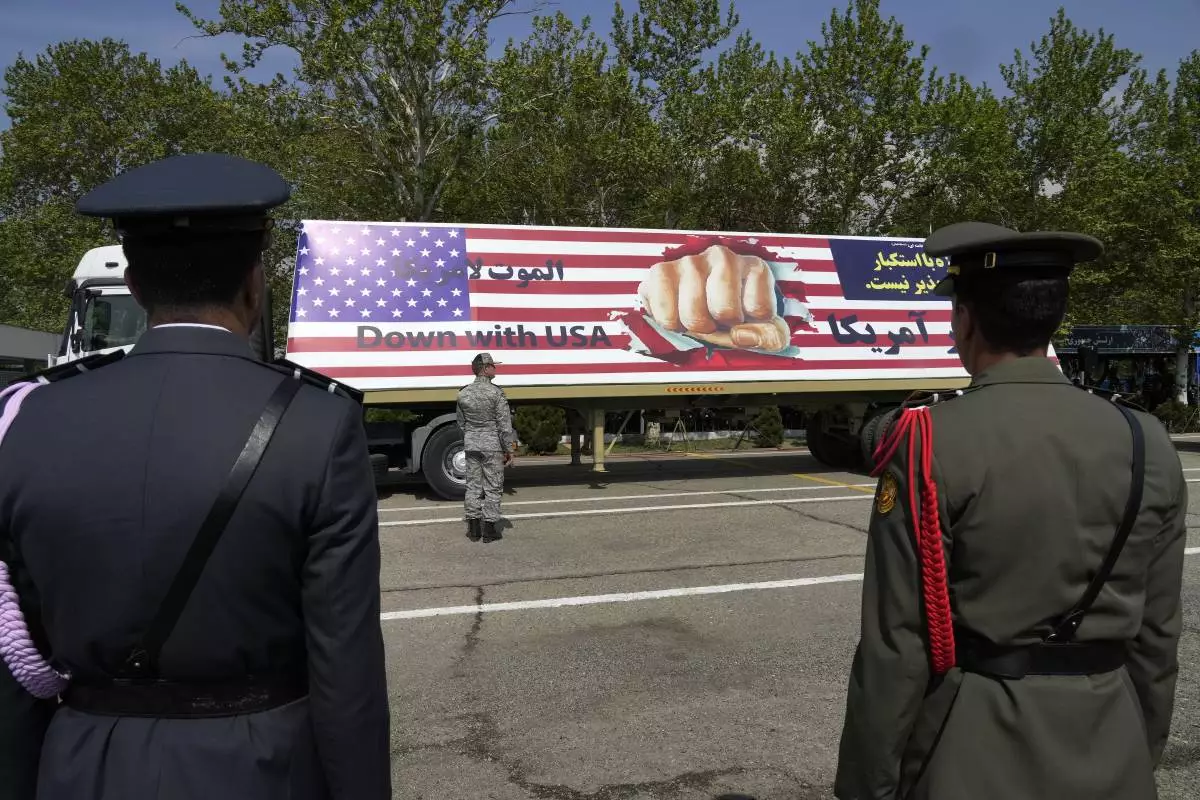
FILE - An anti-U.S. banner is carried on a truck during Army Day parade at a military base in northern Tehran, Iran, April 17, 2024. This month's unprecedented direct attacks between Iran and Israel are revealing deeper insights into both militaries. Experts say Friday's apparent precision strike by Israel deep into Iran demonstrated Israel's military dominance on almost all fronts. (AP Photo/Vahid Salemi, File)
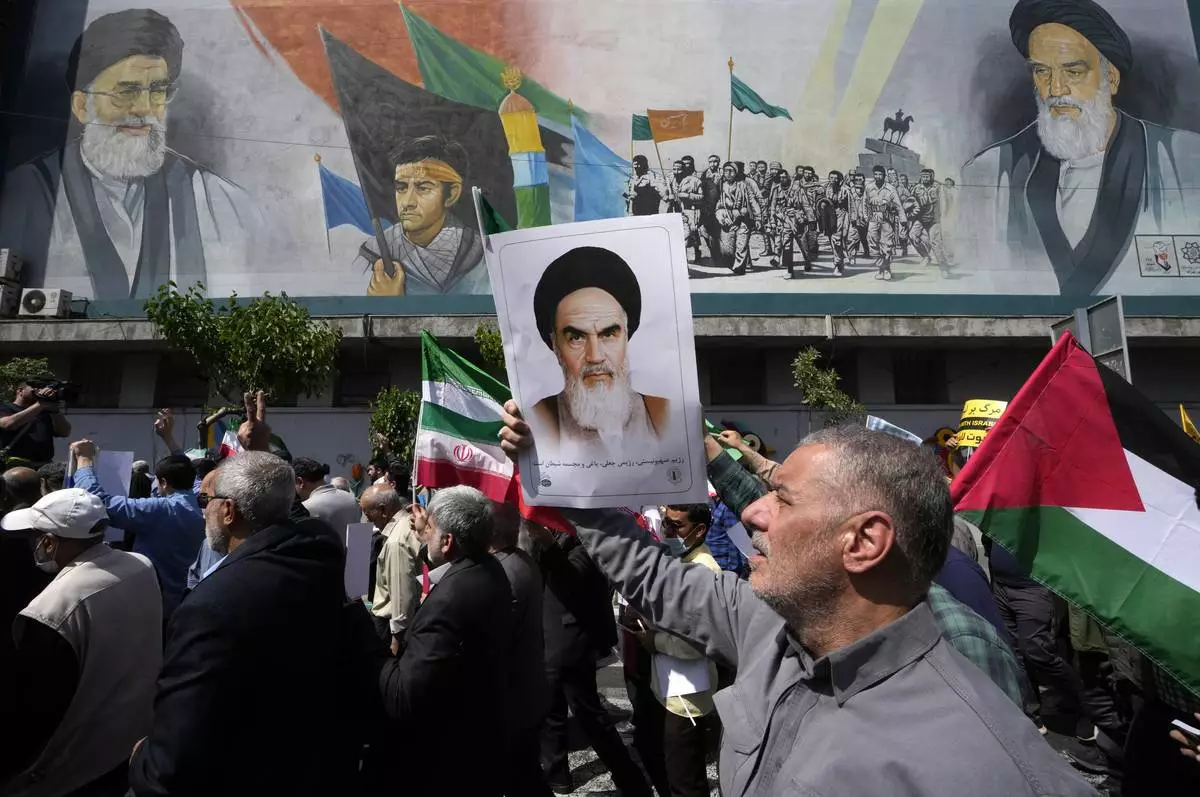
FILE - Iranian worshippers walk past a mural showing the late revolutionary founder Ayatollah Khomeini, right, Supreme Leader Ayatollah Ali Khamenei, left, and Basij paramilitary force, as they hold posters of Ayatollah Khomeini and Iranian and Palestinian flags in an anti-Israeli gathering after Friday prayers in Tehran, Iran, April 19, 2024. This month's unprecedented direct attacks between Iran and Israel are revealing deeper insights into both militaries. Experts say Friday's apparent precision strike by Israel deep into Iran demonstrated Israel's military dominance on almost all fronts. (AP Photo/Vahid Salemi, File)







